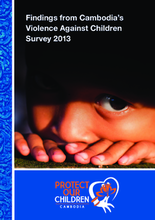The results of the 2013 Cambodia Violence Against Children Survey (CVACS) provide, for the first time, national estimates that describe the magnitude and nature of sexual, physical and emotional violence experienced by girls and young women and boys and young men in Cambodia. This information is designed to help support efforts in Cambodia to develop and implement effective child-friendly prevention strategies as well as to improve service provision for all Cambodians, especially children, who experience violence. The objectives of the survey were to provide nationally representative data on the prevalence of physical, emotional and sexual violence perpetrated against boys and girls; identify risk and protective factors; identify the health and social consequences associated with violence against children; assess the knowledge and utilization of services available for children who have experienced violence; identify areas for further research; and make recommendations to the Government of Cambodia and international and local partners on developing, improving and enhancing prevention and response strategies to address violence against children.
The study consisted of a cross-sectional household survey of 13- to 24-year-old females and males to estimate the burden of violence against children in Cambodia. Specifically, the survey estimates lifetime prevalence of childhood violence before age 18 and the prevalence of childhood violence in the 12 months prior to the survey among 13 to 17 year olds. The sampling frame was originally compiled by the National Institute of Statistics (NIS) for the national population census in 2013. A total of 2,560 individuals were invited to participate in the study with 1,121 females and 1,255 males completing the questionnaire (2,376 in total), which produces individual response rates of 93.7% for females and for males of 92.1%. In addition to the national survey, a qualitative research was carried out to inform and generate a better and more indepth understanding of the quantitative findings of the CVACS, with a focus on the disclosure of violence. An overall research framework was tailored to different age groups that were divided by sex. In total, 117 participants took part in the qualitative research: 55 females and 62 males which was conducted in November 2013. The qualitative findings are meant to add to understanding the context in which the quantitative findings are presented, however cannot be directly compared.
The findings from the survey indicate that violence against children is a serious problem in Cambodia: more than half of all Cambodian children experienced some form of physical violence prior to age 18 by an intimate partner, parent or adult relative, or community member. Roughly a quarter of Cambodian children are emotionally abused while growing up: almost 1 in 5 females and a quarter of males aged 18 to 24 years, and nearly 3 in 10 females and males aged 13 to 17, experienced emotional violence by a parent, caregiver or other adult relative prior to age 18. Lastly, rates of childhood sexual abuse are significant: 4.4% of females and 5.6% of males aged 18 to 24 experienced some form of sexual abuse prior to age 18. More than 6% of females and 5% of males aged 13 to 17 reported at least one experience of childhood sexual abuse. These results have significant implications for the design and implementation of prevention and response programmes in Cambodia. If its underlying causes are identified and addressed, violence against children is entirely preventable.
The current study is based on UNICEF’s successful partnership with the US Centers for Disease Control and Prevention (CDC) in implementing national surveys on violence against children in African countries and in Haiti (Violence Against Children Surveys). Nine countries in the East Asia and Pacific region expressed a serious interest in conducting similar data collection. Cambodia was the first country in the Asia-Pacific region to conduct the Violence Against Children Survey (VACS), with the recommendation for undertaking this effort identified by the Government. In a partnership since 2009, the Government of Cambodia and UNICEF have collaborated closely with the CDC to design and implement CVACS. Line ministries, as members of the multi-sectoral government stakeholder Steering Committee on Violence Against Children, applied their specific areas of expertise at relevant stages in the process through technical working groups. Of paramount importance was the study’s adherence to strict and comprehensive ethical guidelines on research on violence issues, particularly in relation to seeking parental consent, while protecting the confidentiality of participants. Fourteen teams (male and female groups) were recruited and trained, and implemented the survey between February and March 2013. Fieldwork was monitored on an ongoing basis by a working group led by the NIS of the Ministry of Planning (NIS/MoP), the Ministry of Women’s Affairs (MoWA), the Ministry of Social Affairs, Veterans and Youth Rehabilitation (MoSVY), UNICEF and CDC.

